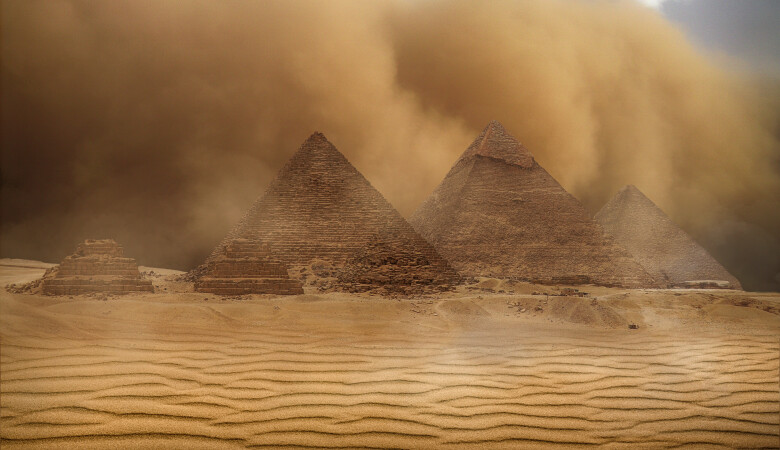Celebrating God's All-Conquering Grace (Isaiah Sermon 12 of 80)
July 27, 2008 | Andy Davis
Isaiah 12:1-6
Grace, Glory of God, Evangelism, Worship, Propitiation
Pastor Andy Davis preaches a verse by verse expository sermon on Isaiah 12:1-6. The main subject of the sermon is the guaranteed victory of God's saving grace over the world.
- SERMON TRANSCRIPT -
Introduction
There are a number of books that come along in a Christian’s life and change his entire way of thinking. Those things are good. It’s a gift of God, a gift of His grace, that teachers in the church can lift up a theme or an insight and so press it to our hearts that we’re never the same again. There have been a number of books like that in my life. Of course, I’m not speaking of the Bible here. That’s in a whole different category. The Bible lifts us up every day and speaks the blessing and promises and commands of God. I’m talking about books written by Christians that strengthen us in the Christian life. One of those books, for me, has been Randy Alcorn’s book “Heaven.”
This book has been an incredible blessing to me because it’s shown me how much I underestimate my heavenly reward and the power of meditating on heaven and heavenly life. I underestimate the joy that meditating on heaven gives, the strength and the energy for Christian service. Brothers and sisters in Christ, it is not a guilty pleasure for us to think a lot about heaven. It’s actually commanded. We should be thinking about heaven. Alcorn, in the beginning of his book, talked about somebody that was trying to swim across the English Channel. There was fog and the person failed in his attempt. After being pulled out and saved, he said, “I think I would have made it if I could’ve seen the shore.”
I think there’s such a lesson for us: we have to keep the shore in front of us every day. We’re going to make it, friends. We’re going to be there someday. We’re going to see God face to face, and we need to rejoice with great joy. What Alcorn’s book did for me more than anything was to blow away the idea that we’re going to be sitting on wispy clouds and bored for eternity, that we’re going to be strumming on these harps and chanting songs that after the first 100 years aren’t so exciting any more. We’re going to be bored and we’re going to look around and all we’re going to see is white everywhere. We’re going to long for color and something under our feet other than this wispy cloud that we’re sitting on all the time.
This vision of heaven is actually satanic because it’s not true. We’re going to be resurrected in physical bodies, and we’re going to be living in a physically resurrected world called the New Heaven and the New Earth. Heaven is going to come down in the form of the New Jerusalem and God’s throne is going to be there. It’s all going to be so very real. We’re going to walk on resurrected feet on a resurrected earth. We’re going to see glory and we’re going to touch things and taste things and work and experience things that we can scarcely imagine.
For the Praise of His Glorious Grace
God’s Ultimate Goal: His Glory
All of that’s wonderful. It’s glorious and it’s good. It’s good for us to meditate on these things. But you know something? In the end, the center of our joy in heaven will be worshipping and praising Almighty God. That actually hasn’t changed. I think what Alcorn’s book did for me was to help me to remember again that it’s impossible that worshipping God could be boring. It’s just impossible. Giving praise and honor and glory and worship to God could not possibly be boring. He is the One who created the physical world we live in now (even in its corrupted state) with all of its beauty and its variety. He is the One who created all the different kinds of birds and animals and plants, all of the things that we experience in the immense variety of our physical lives here on Earth.
All of that comes from someplace, friends. It comes from the mind of Almighty God, and it’s going to be even better in the New Heaven and New Earth. There will be even more clear and powerful displays of the glory of God’s thoughts, His character, His love for us, and His goodness towards us in Christ than we can possibly imagine. All we’re going to want to do all the time is praise Him and give Him honor and glory. And you know something? That’s what we are created to do. We just don’t do it well here on Earth.
Jonathan Edwards, in a sermon entitled, “Praise, One of the Chief Employments of Heaven,” says, first of all, there’s going to be employment in heaven. We’re not going to be sitting around doing nothing. We’re going to be busy in heaven, but the chief employment will be praising God. He said the reason we don’t do it now like we should is because we don’t really see God clearly now. We see Him through a glass darkly, but then we shall see face to face. How rich that will be when, at last, we see how much He has loved us in Christ. When we see the greatness of His mercy to us in Christ, how great it will be.
We know from scripture that God created the heavens and the earth for the praise of His glorious grace. Even more than that, we know from many places in scripture, but I think especially in Ephesians Chapter 1, that God has crafted the Salvation Plan. He has crafted redemptive history for the praise of His glorious grace so that we might worship Him for His grace to us in Christ Jesus. He says it three times in those verses. In Ephesians 1:3-6, it says, “Praise be to the God and Father our Lord Jesus Christ, who has blessed us in the heavenly realms with every blessing in Christ. For He chose us in Him before the creation of the world to be holy and blameless in His sight. In love he predestined us to be adopted as his sons through Jesus Christ, in accordance with his pleasure and will. To the praise of His glorious grace, which he has freely given us in the One He loves.”
That’s why He did it all. That’s why He predestined us. That’s why He is working out “everything in conformity with the purpose of His will, in order that we, who were the first to hope in Christ, might be for the praise of His glory. And you also were included in Christ” (Eph 1:11-13) so that you also might be for the praise of His glorious grace. That’s why he’s done it all. And so we are going to be worshipping God. We’re going to be praising Him. We’re going to be standing in awe as history itself unfolds with a fresh vision of what God did in it, of His amazing grace to a variety of sinners.
We’re going to see who we really were and how gracious God was to us. How plentiful were His effusions of grace to cover us moment by moment in all of our weakness and our acts of rebellion! We’re going to see in a fresh way just how much patience He showed to Saul of Tarsus, that blasphemer and murderer. Paul will be right there, astonished and amazed at the grace of God shown to him in Christ. We’re going to see God’s mercy and the tenderness that He showed here in this world, in space and time, to those who were weak and frail, broken by sin patterns, habits, drunkenness, sexual immorality, and all kinds of bad decisions. We’re going to see how gracious He was to each one of them. We’ll see how much power He has extended to each one of us to protect us from the evil one, all of his demonic intentions, and the powers and principalities that are against us.
God’s Second-Highest Goal: Our Joy in Him
How much power He extended to us in Christ so that we would make it through! We will know just what kind of power held us through it all so that we would not drift away, turn away, or fall away from Christ. We will see it all and that will be for the praise of His glory. That’s the center of heaven, this throne of God’s grace and the greatness of the praise that he deserves. But the second reason that God did it all is because He just loves us and wants us to be happy. The greatest thing He can give us is Himself so that we might see it, we might experience Him, we might be joyful in Him, and we might have experiences of pleasure and joy and satisfaction in Him. That’s the secondary reason.
It’s not first because man can’t be first. God is first. God is glorious and displayed as glorious. That’s the highest reason for everything. But secondly, that we would taste and see that the Lord is good, and that we would be tasting it forever. To this end, Jesus prayed in John 17:24, “Father, I want those whom you have given me to be with me where I am, and to see my glory, the glory you have given me because you loved me before the creation of the world.” “I want them to see it, Father. I want them to experience it. I want them to know how much you love me, and in me, how much you love them. I want them to see my glory."
He prays for it. To this end, Christ entered the world. To this end, He lived a sinless life. To this end, He shed His blood on the cross. He died in our place. To this end, He was raised from the dead. To this end, He sent forth His Spirit to advance the gospel to the ends of the earth so that all of God’s chosen people from every tribe and language and people and nation might be there and see His glory. So that they might enjoy it, have a good time in His presence, eat at His table, and be refreshed for all eternity. That’s what He’s doing.
What Grace had to Conquer
Now, as we come to Isaiah 12, we come therefore to a psalm of praise. Right in the middle of the unfolding of this magnificent prophecy, we get these six verses of praise. It just seems so appropriate. To the praise of His glorious grace and already in 11 chapters of Isaiah, we’ve seen just how much grace God had to show them and us. It’s just been an unfolding, a river of sin among the Jews and the Gentiles alike. We’ve seen in Isaiah 1 that God expressed his disgust at their religious system, this trampling of God’s courts, all the animal sacrifice without any righteousness at all, without any concern for the poor, the needy, the widow, and the orphan. This machinery of Jewish religiosity, it made Him sick.
He didn’t want any part of their prayers or their worship. In Isaiah Chapter 2, God speaks vigorously against their arrogance and their pride. All human arrogance will be cast down and the Lord alone will be exalted in that day. All the idols will totally disappear. Then in Isaiah 3, we saw the wickedness of Israel’s leaders: their kings, their magistrates, their prophets, their priests, and all of their leaders. We saw how they led Israel astray, how they confiscated the houses of the poor and needy. They used their positions of influence to dominate and crush God’s people. We saw how evil they were and how they led Israel astray.
In Isaiah 5, we saw how God likened the Jews, the Jewish nation, to a vineyard that was cleared of stones with a wall put around it and the choicest vines planted in it. That was the Jews in the promised land. God set up a watchtower. He watched out for them to protect them. Despite all of that, the vineyard yielded only bad grapes, and we saw that God was going to take away their protection. They were going to be trampled. Then it got intensely personal in Isaiah 6, where Isaiah in his calling had a vision of the Lord seated on His throne, high and exalted. The train of His robe filled the temple and above him there were seraphs crying aloud to one another, “Holy, holy, holy is the Lord Almighty. The whole earth is full of His glory.”
Isaiah felt his own sinfulness crying out from within him. “’Woe to me!’ I cried. ‘I am ruined!’ For I am a man of unclean lips, and I live among people of unclean lips, and my eyes have seen the King, the Lord Almighty.’” (Is 6:5) He felt his own wickedness. We see how God dispatched an angel to atone for his sin. Sinfulness, even of that prophet, he the best of men it seemed, the best perhaps of his generation, and he felt his own sinfulness within him.
In Isaiah 7, we see wicked King Ahaz who had no interest in the things of God and who was threatened by an invasion from Israel, the northern kingdom, and from Syria. He was terrified; terrified of dying, terrified of losing his kingdom. Isaiah, the prophet, goes from the Lord and hands King Ahaz a blank check: ask for a sign, whether in the deepest depths or the highest heights. Anything you want and God will display His power for you. King Ahaz throws it in God’s face. He makes an alliance with Assyria, of all people! Of all the nations, he asks these wicked people to deliver him from Israel and Syria. The wickedness of this king!
In Isaiah 8 through 10, we see the wickedness of Assyria itself and of the Jews again displayed. After all of that, in Isaiah 11, is a depiction of the coming reign of the Messiah, a shoot coming up from the stump of Jesse, from his roots a branch bearing fruit. He’s a king who reigns in righteousness and rules in justice. He loves righteousness and hates wickedness. He’s going to strike the earth with the rod of his mouth. The wolf will live with the lamb and the leopard lie down with the calf and the lion and the yearling together, a picture of peace to the ends of the earth. It’s a peaceful reign where righteousness is at the center. You almost get the feeling that Isaiah says, “how can it be that a race, the human race, as wicked as us could get a king like that, reigning like that in righteousness?”
“How can it be? Oh, praise You, Lord! I praise You and I give you thanks! I’m going to take six verses here, in the middle of it all, and I’m just going to praise You for that coming kingdom. I’m going to worship You and I’m going to give You praise and glory in Isaiah12. I’m going to give You honor for what You’re going to do, for your salvation work force in Christ.” Now, of course, Isaiah didn’t know about Chapter 12 or six verses or any of that. He just wrote under the inspiration of God. But we have the privilege to come along centuries later and join him in a celebration of God’s grace. How much has that grace had to overcome in their lives and how much in yours? But where sin abounds, my friends, grace abounds all the more. Grace wins. Praise His holy name!
Praise: Healed from Insanity to Healthy Delight
And so we come to a time of praise and of worship. And as we do, we recognize that this is a healing of the human soul. We don’t naturally praise God, frankly. We naturally curse Him and hate Him. But we are being healed from the insanity of sin, the insanity of not praising God. We’re going to be healed into sanity. It really is insane not to praise a God like this. I don’t just mean because He can destroy us in hell. I don’t just mean that He’s got that kind of power. I mean just because He’s so glorious and beautiful and wonderful. Can’t you see Him? Well, we can, just through a glass darkly. It’s just a reflected glory we see now.
You know what? The redeemed are going to be singing in heaven. It says this in Revelation 15:3-4, while history’s still unfolding there, “Great and marvelous are your deeds, Lord God Almighty. Just and true are your ways, King of the ages. Who will fear you, O Lord, and bring glory to your name? For you alone are holy.” It’s almost a sense of amazement. How can they not worship you? Oh, I look forward to being healed as Nebuchadnezzar was from his beast-like insanity. At last, the Lord took that from him and he lifted up his eyes and he praised God, the Most High. And so we will do in heaven.
Your Personal Theme: “God is my salvation” (vs. 1-2)
Personal Salvation, Personal Praise
Look at Isaiah 12: 1-2. It says there, “In that day you will say, ‘I will praise you, O Lord. Although you were angry with me, your anger has turned away and you have comforted me. Surely God is my salvation; I will trust and not be afraid. The Lord, the Lord, is my strength and my song; He has become my salvation.’” That’s your personal theme. For you individually: God is my salvation. The Hebrew here is singular. In that day, you, singular, will say, “God is my salvation.” You, individual sinner, are saved by grace. You’re going to stand before Him and you will say this. This is a word of prophecy, spoken to individual persons who God will save. After that immense work of salvation is completed in your soul, you’re going to stand in front of Jesus. And you will say this. We’re saved as individuals. We’re personally called as individuals to the Savior.
John 10:3 says, “He calls his own sheep by name and leads them out.” He gives them eternal life. Your name is your individuality. It’s who you are. He calls you by name. And so Paul says beautifully, in Galatians 2:20, making it very intensely personal, “I have been crucified with Christ and I no longer live, but Christ lives in me. The life I now live in the body, I live by faith in the Son of God, who loved me and gave himself for me.” Paul’s not there denying that Jesus also died for a multitude greater than anyone could count, from every tribe and language, people, and nation. He’s just saying that this is also true: He died for me, for me personally, for me individually. Isaiah says to the individual sinner that, saved by grace, in that day you’ll praise God.
In what day? Well, whenever that phrase shows up in Isaiah (and it’s many, many times) it refers to a future day of judgment. Of wrath poured out. But here, it’s speaking of grace. So I look ahead to Judgment Day when at last I, a sinner, am vindicated by the blood of Jesus and welcomed into eternity in His name. In that day, I’m going to be thanking Him for His salvation because things are going to be very clear that day. It will be very clear on Judgment Day that I was saved by grace and that my works could not help me at all. Why? Because God’s wrath has been satisfied. Look again at verse 1, “I will praise you, O Lord. Although you were angry with me, your anger has turned away and you have comforted me.”
God’s Wrath Satisfied
God has a passionate, emotional reaction to evil. He hates it and He gets angry about it. He is a God, it says, who expresses His wrath every day. JI Packer, speaking of God’s anger and wrath, says this in his book “Knowing God,” “It is not the capricious, arbitrary, bad-tempered and conceited anger which pagans attribute to their gods. It’s not the sinful, resentful, malicious, infantile anger which we find among men. It is a function of that holiness which is expressed in the demands of God’s moral law. ‘Be holy because I am holy.’ 1 Peter 1:16”
Throughout the first ten chapters of Isaiah, we saw depicted again and again the wrath of God. Remember there was that phrase, “Yet for all of this his anger is not turned away, his hand is still upraised.” It says it again and again. For example, in Isaiah 5:25, “Therefore the Lord’s anger burns against his people; his hand is raised and he strikes them down. The mountains shake, and the dead bodies are like refuse in the streets. Yet for all this, his anger is not turned away, his hand is still upraised.” But in Isaiah 12:1, he says, “I will praise you, O Lord. Although you were angry with me, your anger has turned away and you have comforted me.”
What can turn away the wrath of God? What can turn away His wrath so that it’s not on us anymore as individuals? We come now to that doctrine called propitiation: the turning away of the wrath of God by the giving of a sacrifice. It is the foundation of our faith. God’s wrath can turn away from us to a substitute, and the substitute can be our lightning rod. He can draw the wrath of God away from us so that we never have to experience it. Jesus Christ is the One who made this verse come true.
It is because of Jesus that the anger of God has turned away from me as an individual. God’s not angry with me anymore. There’s no wrath for me to experience. It’s been removed. It’s been absorbed. It’s been propitiated. Jesus has stood in my place. He drank the cup of God’s wrath on the cross. God will never be angry with me because of sin again. Oh, how hard it is for us sinners to believe this!
I dare say it’s hard for you. I tell you it’s hard for me. I mean to really believe that God’s anger has turned away and He’s now in a state of comforting us. I’m not saying that God doesn’t discipline us for sin. He does. But that’s not wrath, friends. That’s not anger. That’s a loving, caring stroke from a Father who knows that the biggest evil in our lives is sin and wants to wean us from it. From our insane love of it. But the wrath is gone, my friends, if you’re in Christ. It’s gone. Are you in Christ? I see some unfamiliar faces here today. Some guests. Praise God that you’re here! I’m glad that God brought you. I don’t know your spiritual state. Even if I knew you well, I wouldn’t definitely know your spiritual state. Do you know that the wrath of God has been removed? Do you understand that Jesus is your substitute?
Isaiah will say later in Isaiah 53:5-6 “He was pierced for our transgressions, he was crushed for our iniquities; the punishment that brought us peace was upon him, and by his wounds we are healed. We all, like sheep, have gone astray, each of us has turned to his own way; and the Lord has laid on him the iniquity of us all.” Friends, in paganism man propitiates the gods by choosing a suitable sacrifice that will avert the gods’ wrath. It’s a work of man to find something big enough that will turn the gods’ wrath away from that person. We can’t do that. It’s impossible for us to avert the wrath of God. It’s something that God must do Himself. And He has done it in Christ.
JI Packer said that kind of pagan view of propitiation opens up a kind of commercialism with God, a transactional approach. If I can find something good enough, I can pay for my sins this way. Well, you can’t. It’s something only God can do. And you can only receive it by faith, simply by trusting in the blood shed on the cross for you. It says in Romans 3:23-24, “All have sinned and fall short of the glory of God, and are justified freely by his grace through the redemption that come by Christ Jesus.” Listen to Romans 3:25, “God presented him as a sacrifice of atonement, through faith in his blood.” Propitiation means that the wrath of God is averted by the giving of a blood sacrifice. That’s the key to our faith. Have you received it? Are you standing forgiven now before the throne of God?
If not, I urge you to flee to Christ. I think about Luke’s testimony, as he was sitting there in the pew. Doug, I think that’s where you’re sitting right now. I praise God for your salvation, brother. But it could be that someone else in the sanctuary doesn’t know whether he’s under the wrath of God. You don’t know. You came here today to just go to church, to hear a sermon. Flee to Christ, look to Christ now, while there’s still time. Because today is the day of salvation. Trust in Him. It’s the only way that this verse will be fulfilled for you.
God IS Salvation
Look what else it says in verse 2, “Surely God is my salvation; I will trust and not be afraid. The Lord, the Lord, is my strength and my song; he has become my salvation.” This is a profound concept here. God is not merely your Savior. You know, the one who rescues you from danger? The one who does that, gets you out of danger, that’s a savior. He is your savior, but He’s more than that. He is your salvation. So what’s the difference? Well, when you’re saved out of danger, you get Him. He’s what you get. He is heaven. I’m not saying that there’s not going to be a new heaven, a new earth, but God’s going to be woven all through it. You’ll know it. You’ll just see God in everything He’s made, the glory of God everywhere. He is your salvation.
That is the good news of the Gospel. The good news of the Gospel is God. He is the Gospel. He’s what you get. He’s the one who saves. He’s the one who redeems, who calls, who sanctifies, who glorifies. After all that, He’s the reward you get. As God said to Abram in Genesis 15:1, “Do not be afraid, Abram. I am your shield, your very great reward.” It says in Revelation 22:3-4 “The throne of God and of the Lamb will be in the city, and his servants will serve him. They will see his face, and his name will be on their foreheads.” You get God.
John Piper, in his book “God Is the Gospel,” asks a very poignant question, very powerful. Listen to this. “If you could have Heaven, with no sickness, with all the friends you ever had on earth, and all the food you ever liked, and all the leisure activities you ever enjoyed, and all the natural beauties you ever saw, all the physical pleasures you ever tasted, and no human conflict or any natural disasters, could you be satisfied with heaven if Christ were not there?” I can’t. I can’t imagine it. I’d wonder where He is! After all I’ve learned about Him, I want to see Jesus. I want to be in His presence. I don’t want all of that and no Christ.
Christ IS heaven to me. He has become my salvation. It’s very personal. Is He your salvation? Heaven is heaven precisely because Christ is there. Hell is hell precisely because He’s not there, not in that way. He’s there in wrath, but He’s not there. He has become our salvation.
Our Corporate Pleasure: Joyful Satisfaction in God (vs 3)
Something shared
Now that’s all individual and personal, but He’s not going to leave it there. Isaiah then moves to the corporate experience. You don’t see it in the English because we just have one word, “you,” for both single and plural, but the rest of the hymn of praise is plural. It’s got to do with all of you folks. I can’t say “all y’all” with the joy of a native speaker of southern English. I can’t do it, but you know what I mean, okay? All y’all. Mike Waters has been training me in that. I still can’t quite do it the way I need to, but this is corporate salvation, our joyful satisfaction in God. Verse 3 is plural, “With joy [all of] you will draw water from the wells of salvation.” Oh, what a sweet verse that is! Something shared.
Deep Satisfaction
He’s addressing the whole community of believers and he’s giving an image of deep satisfaction. In the ancient Near East, it’s very dry and they understand very well the value of water. Water is life. Wells are life. To draw water from a healthy, clean well, that is life. Wars are fought over those wells by nomadic tribes. They dig the wells and they’ll fight for them.
Ongoing Refreshment for Eternity in Christ
The image here is finding an endless source of cool refreshing water from which you can drink whenever you’re thirsty. As Jesus said to the Samaritan woman at the well, “Everyone who drinks of this water will thirst again, but whoever drinks the water that I give him will never be thirsty again. Indeed, the water I give him will become in him a spring of water welling up to eternal life.” (Jn 4:3-14) You can drink from it any time you want. With joy, you’re going to draw buckets of water from the wells of salvation. You’re going to drink abundance in God’s household. You will be deeply and richly satisfied. You’re not going to be alone. You’re going to be looking around and there’s going to be this countless multitude from every tribe and language and people and nation. They’re going to be drinking too. They’re going to be satisfied too. They’re going to be giving praise and thanks to God with you. You’re not going to be alone.
Satan keeps lying to us about pleasure. “I am the god of pleasure,” he tells us. “Follow me and you’ll enjoy yourself.” He’s not the god of pleasure. He’s the god of anti-pleasure. He’s the god of misery and death. John 10:10 says, “The thief comes only to steal and kill and destroy.” That doesn’t sound like pleasure to me! “I have come that they might have life and have it abundantly. I want to give you abundant life. I want you to know the joy that comes from being in a right relationship with Almighty God.” With joy, he will draw water from the well of salvation.
Heaven is a place of eternal pleasure. Psalm 16:11 says, “You have made known to me the path of life.” His name is Jesus, by the way. “You have made known to me the path of life; you will fill me with joy in your presence, with eternal pleasures at your right hand.” And so we’re going to be drinking from the river of the water of life flowing clear as crystal down the center of the city, coming right from the throne. It’s coming right from the throne and on each side of the river there’s going to be the tree of life with crops every month, and the leaves of the tree are for the healing of the nations. It’s going to be a rich, full experience, and we’re going to be there with people from all over the world.
Our Universal Mission: Magnify the Greatness of God
Evangelism: Proclaiming Among the Nations the Greatness of God
So that leave us, thirdly, with our universal mission, which is to magnify the greatness of God. This is for all of us as well. “In that day, you will say, ‘Give thanks to the Lord, all in his name; make known among the nations what he has done, and proclaim that his name is exalted. Sing to the Lord, for he has done glorious things; let this be known to all the world. Shout aloud and sing for joy, people of Zion, for great is the Holy One of Israel among you.” (Is 12:4-6) This is missions, friends. This is evangelism. This is sharing the gospel with people who don’t know your joy. And more than that, this is missions and evangelism done as worship. You’re just overflowing with joy.
You’re just happy in Jesus and you’re making known among the nations what He has done, all of His great works of redemptive history. What He did with Abraham, Isaac, and Jacob. What He did with the Jews and how He led them out of Egypt by a mighty hand and outstretched arm, with all the plagues and with the water walling up on the right and on the left. And what He did through the history of Israel and the Jews through King David and all of the kings that followed. God’s patience in dealing with sin. And then how in the fullness of time He sent His only begotten son, born of a virgin, and how Jesus lived a sinless life and did great miracles. You can tell lost people these miracles. They’ll be interested.
If they get past the initial weirdness of talking to you, a total stranger, about spiritual things, they’ll actually want to hear more about Jesus’s miracles. Tell them! Tell them your favorite miracle. If you don’t have one, get one, alright? The resurrection of Lazarus will do just fine. Four days dead. Lazarus, come forth! I tried that with someone once. They said, if they’d been there, they’d have been running away screaming. All right, so that didn’t work too well. But I said, “Look, to me, it’s a happy thing that Lazarus came back to life.” They were thinking it was like a zombie movie or something like that. I said, “No, it’s a resurrection. He’s alive. He’s healthy. They had a feast and celebrated.”
We get to proclaim the greatness of God and all the great things He did and how Jesus himself was dead. And on the third day, God raised Him from the dead. We get to share some of His promises; “Because I live, you also will live.” “I am the resurrection and the life. He who believes in me will live even though he dies; and whoever lives and believes in me will never die.” That’s what we get to say. We get to proclaim that His name is exalted. We get to say that great is the Holy One of Israel among us and proclaim these great things. If you think about missions and evangelism this way, you’ll lose your fear because you’re going to just have an awesome time of worship, whether the non-Christian joins you or not.
Oh, but I hope they do! “I hope you’re with me,” you can say. I hope that you can spend eternity praising a God like this. Repent and believe the Gospel, that your sins can be forgiven. Proclaim that His name is exalted. And so we’re involved in missions. And why? Because there’s going to be a multitude greater than any we can count, from every tribe and language and people and nation. It’s our job to tell them, to go out and proclaim this to people who’ve never heard of His name and to sing among them.
Worship: Immersed in the Greatness of God
I know some of you think singing is weird. Maybe it’s not your favorite thing now. I’ve talked to you. Some of you think, “Kinda just not great on singing.” You will be. You will be. Because it says in the Book of Revelation that you’re going to sing a new song. Music, when done well, just resonates spiritually inside your heart. It just does. I just love good worship. Don’t you? I just love to sing praise songs. There’s a kind of music that’s reserved for heaven. None of us have heard it yet. It’s called a new song. We will resonate with it in our resurrected bodies and minds, and we will love it, and we will sing to it, and we’re going to be joining Jesus who sings. He does. It says so right in Hebrews 2:12, “I will declare your name to my brothers; in the presence of the congregation, I will sing your praises.”
Now, that’s some special music I’d like to hear! Jesus singing in the assembly, the praises of Almighty God, but God Himself singing. Zephaniah 3:17 says, “The Lord your God is with you, he is mighty to save. He will take great delight in you, he will quiet you with his love, he will rejoice over you with singing.” In the Chronicles of Narnia, CS Lewis said, “It was by song that Aslan created the world.” In “The Magicians Nephew,” when Digory and Polly and the rest go into Narnia for the first time, they find it a void. Then a voice, later revealed to be Aslan (representing Christ), sings the new world into existence. It’s by singing that He creates. Perhaps by metaphor, by singing He will create the New Heavens and the New Earth as well. We’ll hear that song and we’ll join in singing it.
Application
Do you praise God like this? These six verses, memorize them. They’re rich. Just set them in front of you and say, “With joy, I’m going to draw water from the wells of salvation. For great is the Holy One among us.” These are great words. Do you praise God like this? You know, right from the beginning, it says, “In that day, you will say, ‘I will praise you, O Lord.” Now stop there. It’s just a way of thinking. “I will praise you today.” That sounds like an act of my will. Well, that’s about what it is.
You have to determine that you’re going to praise Him today. You’re going to rejoice in the Lord today. I know some of your hearts are breaking. I know you’re struggling with sin. You may have come here today feeling defiled and guilty because of sin. Your heart may be breaking for other reasons. You may be going through trials. There might be sickness or death hanging over a loved one, or maybe even over you. You may be facing economic difficulties. You may have lost your job and you haven’t been able to find another job. There may be any one of a number of things causing your misery today. “I will praise you, O Lord. Although you are angry with me, your anger has turned away and you have comforted me.” Can you say that? Will you praise Him? It’s a choice you make, really. It really is a decision as a Christian that you make by the power of the Spirit. “I’m going to praise Him. And Spirit, pass me things all day long that I can praise God for.” He’ll do it.
Finally, are you involved in the mission? Are you involved in evangelism? Have you shared the Gospel with anyone? Have you proclaimed among the nations that His name is exalted? That’s what it says that we’re to do. Find somebody whose spiritual situation you’re unsure about and just praise God in front of him. I would urge you to get into a conversation first or they might have you arrested as somebody insane or something like that. Just get into the conversation and then just talk about the greatness of God, of Christ. You might find that to be the greatest witnessing opportunity you’ve ever had. It’s our responsibility and joy and privilege to proclaim among the nations that His name is exalted.
One final thing: be praying for our friends that are serving the Lord right now. We can join them in their work by praying for them. Pray for the trip that’s out there in East Asia and for the friends that are hosting them and that live there all the time. Pray for that work. Close with me in prayer.































